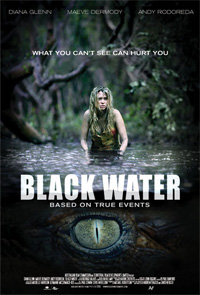Ten Horror Movies Worth Seeing, #5: Black Water
October 8, 2018 in General Topics, Other Stuff
 It’s one thing for a horror film to feature supernatural encounters or marauding monsters. It’s quite another when its antagonist is something Out There. Out There is that place where civilization gives way to an environment in which our comfortable status as nature’s apex predators is no longer certain. There’s something about that which assails our subconscious. We are as much outraged as in wonder.
It’s one thing for a horror film to feature supernatural encounters or marauding monsters. It’s quite another when its antagonist is something Out There. Out There is that place where civilization gives way to an environment in which our comfortable status as nature’s apex predators is no longer certain. There’s something about that which assails our subconscious. We are as much outraged as in wonder.
Black Water takes Out There and subjects us to its possibilities. The bulk of this 2007 film is shot within perhaps twenty feet of a low-lying mangrove and a slow-moving section of Australian river. This works, because the Outback is the Australian Out There, and the Aussie wilds are home to a laundry list of the world’s deadliest species of animals. Australia has a transparent jellyfish the size of a fingernail that has been responsible for the deaths of multiple swimmers. It possesses the inland taipan, the world’s most venomous snake. And then there’s the saltwater crocodile.
“Salties” are amazing beasts. Their adaptability and endurance is legendary–they’ve been known to cross wide tracts of open ocean–but perhaps more terrifying than their brute physical prowess is their intelligence. These crocodilians possess brain structures unique among reptiles; structures found in higher order animals like mammals. Salties have been recorded learning their prey’s patterns, and they’ve been responsible for horrific, perfectly-timed surprise attacks on humans. Black Water was based on one such incident. Let that sink in for a moment.
The film features Diana Glenn as Grace, younger sister of Lee (Maeve Dermody), who, along with Lee’s husband Adam (Andy Rodoreda) decide to go on a guided fishing tour of a mangrove swamp. There’s a few mundane setup pieces common to films like this. The guide skips some critical prep items that would have ensured help would be on the way if something went wrong. He seems to brush off his own better instincts about taking the trip in the first place. Also, Lee reveals to Grace that she’s pregnant, and Adam doesn’t know. You know, little things.
Of course we know it’s all going to go wrong, with these stakes so clearly laid out, but oddly in this film having that foresight doesn’t ruin the experience. The initial wave of dread is compromised, but it isn’t at the cost of the suspense that follows. The crucible of that tension is the setting I mentioned earlier. Among the mangroves we have an overturned boat, a few branches of tenuous refuge that don’t feel (and aren’t) tall enough, and a crocodile that materializes in its environment at will, but never feels like anything other than a realistic portrayal of its species.
I like how this film doesn’t blink at the havoc its unfeeling antagonist wreaks. The saltie isn’t evil, it is hungry, and it doesn’t care about the lives it destroys. This merciless mood is only buoyed by its special effects, which are clean and minimalistic. Directors Andrew Traucki and David Nerlich know that being in the bullseye of such a creature’s hunt is scary enough. There’s no forced moments. In fact, if I had to describe the film, I’d call it restrained. Clean, even. Everything is done to preserve realism. That makes the moments the croc strikes that much more convincing.
So it’s a good watch, with more than a few scenes that will stay with the viewer long after the credits roll. Though the specter of implausibility finally appears at the film’s climax, it doesn’t do fatal damage to this lean, mean take on the Out There. Like the saltwater croc itself, Hollywood could learn a lot by studying a film like this.
In my next review, I’ll highlight another family in peril, though this time it’s a damaged duo on the wrong side of a loss, dealing with grief… and what that pain attracts.

Recent Discussion